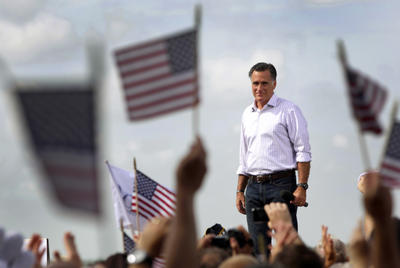Romney has vowed that ‘unless China changes its ways, on day one of my presidency I will designate it a currency manipulator and take appropriate counteraction’. On Taiwan he declared that ‘the Department of Defense should reconsider recent decisions not to sell top-of-the line equipment to our closest Asian allies. We should be coordinating with Taiwan to determine its military needs and supplying them with adequate aircraft and other military platforms’.
Put together, these actions would bring about a crisis in US–Chinese relations, with very grave potential consequences for the global economy and for military tension between the United States and China. And though Romney’s rhetoric about China’s human rights record echoes that of the Obama administration, it is a good deal shriller. If continued when in office, it would also significantly worsen relations.
But would a Romney administration pursue this line? There is, after all, a well-established pattern whereby US parties in opposition condemn US administrations for pursuing realist policies towards China — only to pursue those very same policies when in government. On past occasions the Democrats have used this tactic against the Republicans, and vice versa. This was pre-eminently true of the contrast between anti-Chinese rhetoric by the Republicans in the 2000 election campaign, and the restrained and realistic policies generally pursued by the Bush administration toward Beijing and over issues of key Chinese concern, like North Korea.
It is possible that the staggering economic rise of China over the past decade, and the new centrality of China to US strategy, will alter this. But by the same token, the pivot toward the Asia Pacific has been initiated by the Obama administration, and despite obligatory Republican campaign rhetoric about how this pivot is under-resourced and how Romney would greatly increase spending on the US navy, it is not at all clear how a Republican administration could actually do more, given iron US budget constraints. More sensible military analysts in Washington certainly do not take these promises seriously — and in this they are reflecting widespread opinion within the Pentagon.
A second concern about a Romney administration’s strategy in East Asia is that it might make, or continue, US commitments elsewhere that would further reduce available US resources. These commitments could lead to repeating the situation under Bush, when for a number of years the wars in Afghanistan and Iraq (and to a much lesser extent the pursuit of NATO expansion against Russia) distracted attention from the Far East.
This could potentially lead to a situation in which Romney had contributed to a drastically worsened security situation in East Asia, only to find himself without the resources to back up his strategy. That would be the worst position of all for the United States and its allies.
A worrying sign in this regard — at least as an indication of a basic inability to make realistic calculations about US strategy and interests — is what seems to be a continued obsession in the Republican Party and the Romney camp with Russia as an enemy. Obama’s ‘reset’ with Russia corresponds with the most basic dictates of any sensible foreign policy: to reduce commitments in an area of lesser concern and lesser threat in order to concentrate on a greater and increasing threat. The idea that Russia today compares with China as a threat to US interests is simply misguided.
An interesting force for moderation comes into play here: the US uniformed military. Far from being the warmongers of left-wing mythology, military high command has emerged as a brake on the wilder ambitions of some politicians. For instance, in the last year of the Bush administration, Admiral Michael Mullen and Defence Secretary Robert Gates were instrumental in preventing both stronger US support for Georgia during the war with Russia in August 2008 (when Vice President Cheney wished to send US troops to the region) and a US attack on Iran.
An Israeli attack on Iran with the backing of a Romney administration would not only create a monstrous new crisis in the Middle East, but would nail the US still further to that region, making it even more difficult to redeploy resources to the Pacific. The Romney camp has launched attacks on Obama for ‘abandoning’ Israel, but in fact commitment to Israel is an entirely bipartisan affair — also privately checked to some degree not by political forces, but by the Pentagon.
On the foreign policy front, therefore, it may be that much less would change under a Romney administration than appears from the rhetoric. What remains is the potential impact of unpredictable events, especially in the Middle East but increasingly in the Far East as well. Romney himself might wish to react in a sober and pragmatic fashion to crises, but that is certainly not the instinct of much of the Republican foreign policy establishment.
Anatol Lieven is Professor at the War Studies Department, King’s College, Cambridge, and Senior Fellow of the New America Foundation in Washington, DC. A new edition of his book America Right or Wrong: An Anatomy of American Nationalism will be published this month by Oxford University Press.

